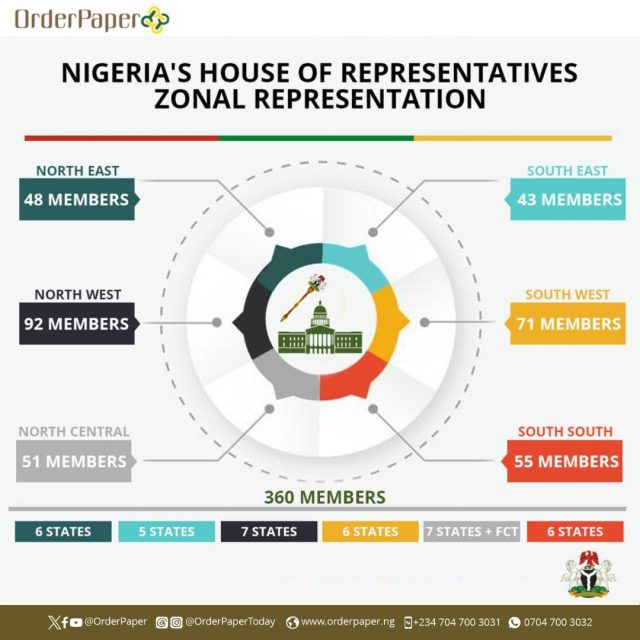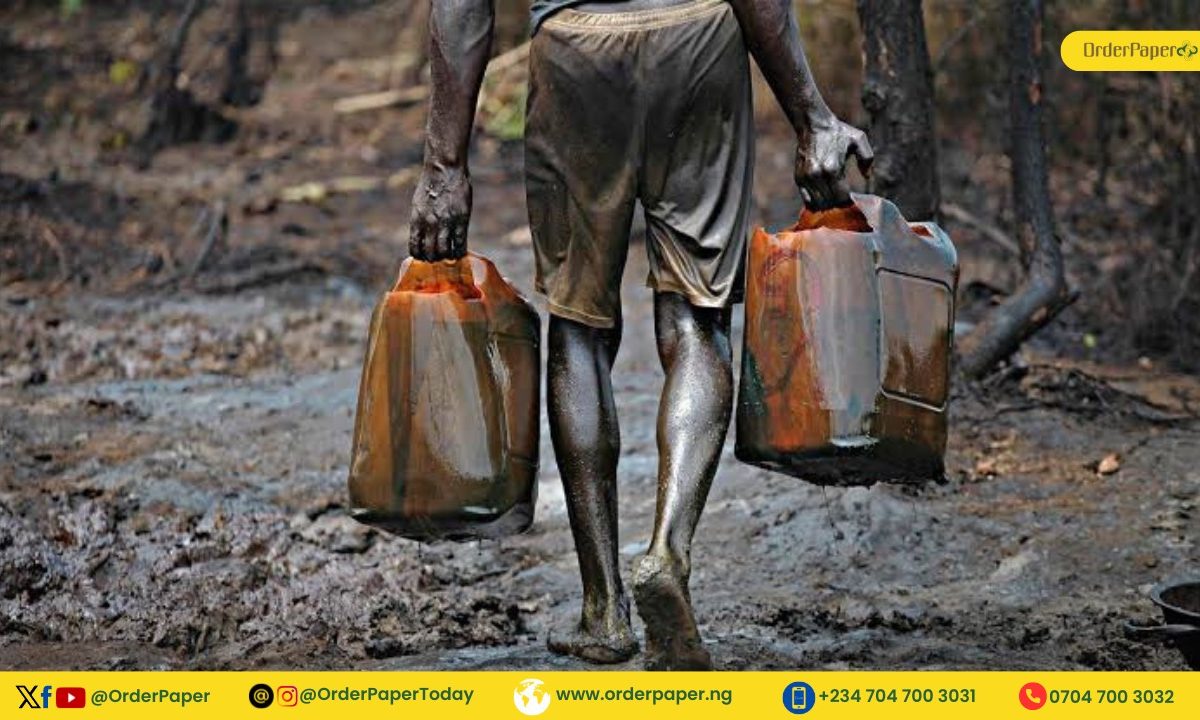The Nigerian National Assembly is the democratically elected body that makes laws, oversights the government, and represents the interests of Nigerians and the country. It is a bicameral legislature comprising the Senate and the House of Representatives. The House consists of 360 members representing the 360 Federal Constituencies in the country. In this explainer, we break down the membership of the House by geo-political zone.

Zones, states and local governments…
Nigeria is broadly divided into the northern and southern parts. These two are further sub-divided into six geo-political zones which help make for administrative convenience and development planning purposes. These geopolitical zones often form the basis for the distribution of educational, economic, and political resources among the citizenry.
The southern part of Nigeria consists of the south-east, south-west, and the south-south geo-political zones. The northern part has the north-east, north-west, and north-central as geo-political zones. Each of these zones consists of states, which sum up to make the thirty-six states, and the Federal Capital Territory (FCT) that the country is comprised of.

The south-east is made up of five states – Anambra, Enugu, Ebonyi, Imo, and Abia. The south-west comprises Lagos, Ekiti, Oyo, Ondo, Ogun, and Osun states. States that make up the south-south, also referred to as the Niger Delta region, are, Rivers, Cross-Rivers, Bayelsa, Delta, Edo, and Akwa-Ibom.
The north-east zone consists of Borno, Adamawa, Taraba, Yobe, Bauchi and Gombe states; the north-west is made of the following: Kaduna, Katsina, Zamfara, Kano, Sokoto, Kebbi, and Jigawa States; just as Benue, Kwara, Kogi, Benue, Nasarawa, Plateau, Niger states, and the FCT make up the north-central geo-political zone.
For better coordination and representation particularly, at the federal level, each of these states is further divided into Local Government Areas (LGAs), which comprise the third tier of government in the federation. There are a total of 774 LGAs and 6 Area Councils (in the FCT) in Nigeria. These LGAs and Area Councils are further grouped into 360 clusters known as Federal Constituencies. A constituency is a geographically defined area in which voters elect a representative to a legislative body such as the National Assembly or a State Assembly.

The lop-sided composition of Nigeria’s House of Representatives
As seen above, not all six geo-political zones have equal number of states and local government areas. The south-east, clearly, has the least number with five states. Consequently, it gets the least share of representation, resources and patronage as far as the federation is concerned. Below is the way the zones are composed and what it means in terms of the numbers in the House of Representatives.
North-west zone…
The north-west is the geo-political zone with the most states and population. With 7 states and a total of 186 LGAs in its kitty, it takes the largest chunk with 92 Federal Constituencies, and consequently, the highest number of members in the House of Representatives
With 24 seats of the 92, Kano state has the highest number of representation in this zone. Kaduna and Katsina follow with 16 and 15 seats respectively. Jigawa and Sokoto states each have 11 seats, while Kebbi state holds on to 8 seats.
READ ALSO: 10TH NASS: Composition of the Nigerian House of Representatives | Age, Gender
South-west zone…
This zone is made up of 6 states and 137 Local Government Areas. It trails behind the north-west zone with a representation of 71 members in the House of Representatives, otherwise called the green chamber.
Of the 71 members from this zone, 24 are from Lagos and 14 from Oyo state respectively. Ogun, Osun and Ondo states each have 9 members, while Ekiti is represented by 6 members.
South-south zone…
The south-south (Niger Delta region) also consists of six states. It comprises 123 Local Government Areas, from which 55 Federal Constituencies were created. It is represented by 55 members in the green chamber of the National Assembly.
Rivers state ranks top in this zone with 13 members. Delta and Akwa-Ibom states follow with 10 members each; Edo occupies 9 seats, while Bayelsa is left with 5 seats.
North-central zone…
Six states and the FCT make up this geo-political zone. It comprises 151 LGAs and 6 Area Councils of the FCT. This zone occupies 51 seats in the House of Representatives.
The state with the most representation in this zone is Benue with 11 members. Niger follows with 10 members; Kogi has 9; Plateau holds on to 8; Kwara has 6; while Nasarawa and the FCT have 5 and 2 members respectively.
North-east zone…
With 6 States and 112 Local Government Areas, the north-east geo-political zone is the second region with the least representation. 48 Federal Constituencies were created from these LGAs. As such, it has 48 member-representation in the House of Representatives.
In this region, 12 of the 48 seats belong to Bauchi; 10 to Borno; Adamawa occupies 8, while Gombe, Yobe and Taraba have 6 seats each.
South-east zone…
The south-east has the least number with only 5 states. These states share 95 Local Government Areas between themselves. The region boasts of only 43 members in the House, making it the zone with the least number of representation in the House of Representatives.
Anambra takes the highest chunk in this region with an 11-member representation. It is closely followed by Imo state, which boasts of 10 members. Abia and Enugu have 6 members each, leaving Ebonyi state with the least representation of 5.



One comment
Ike
January 15, 2024 at 8:14 pm
This country sef !!! Representation based on population promotes easy road to overpopulation. No wonder our population is over 200 million